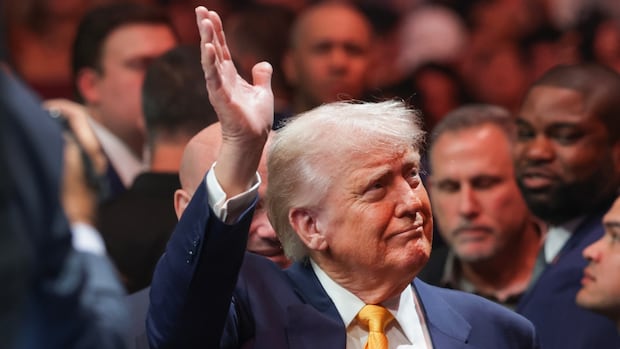U.S. Commerce Secretary Howard Lutnick said on Sunday that smartphones, computers and some other electronics, just exempted from steep tariffs on imports from China, would face separate new duties along with semiconductors within the next two months.
Lutnick’s comments on ABC’s This Week flagging the coming levies on critical technology products mark the latest twist in President Donald Trump’s tariff plans, which have upended the global trading order and roiled financial markets since they were announced on what he branded “Liberation Day” on April 2.
Late on Friday, the Trump administration granted exclusions from the steep tariffs on smartphones and a set of other electronics products, a move seen as a big break for technology firms such as Apple and Dell Technologies that rely on imports from China.
For the Chinese imports, the exclusion of the tech products applies only to Trump’s “reciprocal” tariffs, which reached 125 per cent this week. Trump’s prior 20 per cent duties on all Chinese imports that he said were related to the fentanyl crisis remain in place.
Trump’s back and forths on tariffs have kicked off a trade war with China and prompted the wildest swings on Wall Street since the COVID pandemic of 2020. The benchmark S&P 500 index is down more than 10 per cent since Trump took office on Jan. 20.
Lutnick said Trump would enact “a special focus-type of tariff” on smartphones, computers and other electronics products in a month or two, alongside sectoral tariffs targeting semiconductors and pharmaceuticals. He said those new levies would fall outside Trump’s so-called reciprocal tariffs, under which levies on Chinese imports climbed to 125 per cent this week.
The Trump administration says it will exclude electronics such as smartphones and laptops from latest tariffs. That means such devices and their components won’t be subject to the current 145 per cent tariffs levied on China, or the 10 per cent baseline tariffs elsewhere.
“He’s saying they’re exempt from the reciprocal tariffs, but they’re included in the semiconductor tariffs, which are coming in probably a month or two,” Lutnick said in the interview on ABC, predicting that the levies would bring production of those products to the United States.
“These are things that are national security, that we need to be made in America,” Lutnick said.
With his comments, Lutnick appeared to go beyond what was communicated on Saturday, when a White House official told media that Trump would launch a new national security trade investigation into semiconductors soon that could lead to other new tariffs.
Beijing increased its own tariffs on U.S. imports to 125 per cent on Friday, striking against Trump’s tariffs. China said on Sunday that it was evaluating the impact of the exclusions for the technology products implemented late on Friday.
“The bell on a tiger’s neck can only be untied by the person who tied it,” China’s Ministry of Commerce said.
Mocking videos and images of U.S. President Donald Trump and overweight Americans are sweeping Chinese media as Beijing retaliates against 145 per cent U.S. tariffs by hiking its levies on U.S. goods to 125 per cent.
Billionaire investor Bill Ackman, who endorsed Trump’s run for president but who has criticized the tariffs, on Sunday called on him to pause the broad and steep tariffs on China for three months, as he did for most countries last week.
“If President Trump were to pause the China tariffs for 90 days and reduce them temporarily to 10 per cent, he would achieve the same objective in causing U.S. businesses to relocate their supply chains from China without the disruption and risk to these businesses in the short term, and he would have time to negotiate a deal with China,” Ackman wrote on X.
‘There is no tariff policy — only chaos’
U.S. Senator Elizabeth Warren, a Democrat, criticized the latest revision to Trump’s tariff plan, which economists have warned could dent economic growth and fuel inflation.
“There is no tariff policy — only chaos and corruption” Warren said on ABC’s This Week.
Chief political correspondent Rosemary Barton speaks with former U.S. treasury secretary Larry Summers about the impact of U.S. President Donald Trump’s tariffs on the global economy.
In a notice to shippers late on Friday, the U.S. Customs and Border Protection agency published a list of tariff codes excluded from the import taxes. It featured 20 product categories, including computers, laptops, disc drives, semiconductor devices, memory chips and flat panel displays.
In an interview on NBC’s Meet the Press, White House trade adviser Peter Navarro said that the United States has opened an invitation to China to negotiate but criticized its connection to the lethal fentanyl supply chain and did not include them on a list of seven entities — the United Kingdom, the European Union, India, Japan, South Korea, Indonesia and Israel — with which he said the administration was in talks.
“They’re just lining up outside the door of Jamieson Greer,” Navarro said, referring to the U.S. trade representative.
Greer said on CBS’s Face the Nation that there are no plans yet for Trump to speak to Chinese President Xi Jinping on tariffs, accusing China of creating the trade friction by responding with levies of its own.
China is hitting the U.S. in a vulnerable spot as the trade war escalates between the two. Then, Andrew Chang explains why the math used to determine President Donald Trump’s global reciprocal tariffs is misleading.
“The only reason we’re really in this position right now because China chose to retaliate,” he said.
Ray Dalio, the billionaire founder of the world’s biggest hedge fund, told NBC’s Meet the Press that he was worried about the U.S. sliding into recession, or worse, as a result of the tariffs.
“Right now we are at a decision-making point and very close to a recession,” Dalio said on Sunday. “And I’m worried about something worse than a recession if this isn’t handled well.”




